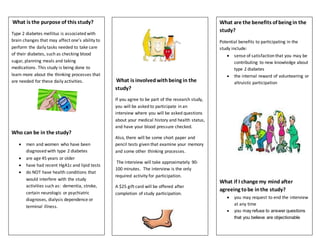Report
Share

Recommended
CGAGavin belson comprehensive geriatric assessment an introduction

Gavin belson comprehensive geriatric assessment an introductionGeriatric Emergency Medicine Bootcamp
Recommended
CGAGavin belson comprehensive geriatric assessment an introduction

Gavin belson comprehensive geriatric assessment an introductionGeriatric Emergency Medicine Bootcamp
Presented by Dr. Katharine Gillis at our annual Women in Mind conference on women's mental health.
She was appointed Chair of the
Department of Psychiatry at the University of Ottawa
in 2009, Interim Head, Department of Psychiatry,
Ottawa Hospital in July 2013; and is a national leader
on psychiatry education.WOMEN IN MIND: An approach to sick leave & disability in women with mood diso...

WOMEN IN MIND: An approach to sick leave & disability in women with mood diso...The Royal Mental Health Centre
More Related Content
Similar to Recruitment Brochure 5.27.15
Presented by Dr. Katharine Gillis at our annual Women in Mind conference on women's mental health.
She was appointed Chair of the
Department of Psychiatry at the University of Ottawa
in 2009, Interim Head, Department of Psychiatry,
Ottawa Hospital in July 2013; and is a national leader
on psychiatry education.WOMEN IN MIND: An approach to sick leave & disability in women with mood diso...

WOMEN IN MIND: An approach to sick leave & disability in women with mood diso...The Royal Mental Health Centre
Similar to Recruitment Brochure 5.27.15 (20)
MGH---Optimizing Quality of Life in the Treatment of Depression.pptx

MGH---Optimizing Quality of Life in the Treatment of Depression.pptx
WOMEN IN MIND: An approach to sick leave & disability in women with mood diso...

WOMEN IN MIND: An approach to sick leave & disability in women with mood diso...
RUNNING HEAD Analyzing Issues and Need and Identifying Mediators.docx

RUNNING HEAD Analyzing Issues and Need and Identifying Mediators.docx
Taking Care of Myself: A Guide for When I Leave the Hospital

Taking Care of Myself: A Guide for When I Leave the Hospital
Brief interventions and motivational enhancement therapy for alcohol problems

Brief interventions and motivational enhancement therapy for alcohol problems
solution oriented psychotherapy for clinical psychologists

solution oriented psychotherapy for clinical psychologists
Stacey Conroy - Treating OCD and SUD Tools for Effective Treatment

Stacey Conroy - Treating OCD and SUD Tools for Effective Treatment
Link between Mental Health & Diabetes-Role of Telemedicine.pptx

Link between Mental Health & Diabetes-Role of Telemedicine.pptx
Recruitment Brochure 5.27.15
- 1. What is the purpose of this study? Type 2 diabetes mellitus is associated with brain changes that may affect one’s ability to perform the daily tasks needed to take care of their diabetes, such as checking blood sugar, planning meals and taking medications. This study is being done to learn more about the thinking processes that are needed for these daily activities. Who can be in the study? men and women who have been diagnosed with type 2 diabetes are age 45 years or older have had recent HgA1c and lipid tests do NOT have health conditions that would interfere with the study activities such as: dementia, stroke, certain neurologic or psychiatric diagnoses, dialysis dependence or terminal illness. What is involvedwithbeing in the study? If you agree to be part of the research study, you will be asked to participate in an interview where you will be asked questions about your medical history and health status, and have your blood pressure checked. Also, there will be some short paper and pencil tests given that examine your memory and some other thinking processes. The interview will take approximately 90- 100 minutes. The interview is the only required activity for participation. A $25 gift card will be offered after completion of study participation. What are the benefits of being in the study? Potential benefits to participating in the study include: sense of satisfaction that you may be contributing to new knowledge about type 2 diabetes the internal reward of volunteering or altruistic participation What if I change my mind after agreeing tobe inthe study? you may request to end the interview at any time you may refuse to answer questions that you believe are objectionable
- 2. NOTES ____________________________________ ____________________________________ ____________________________________ ____________________________________ ____________________________________ ____________________________________ ____________________________________ ____________________________________ ____________________________________ ____________________________________ ____________________________________ ____________________________________ School of Nursing 400 N. Ingalls Ann Arbor, MI 48109-2003 Phone (734) 763-5650 Cognitive Dysfunction, Functional Status and Glycemic Control In Rural Adults With Type 2 Diabetes Mellitus A research study to examine the thinking processes that help persons perform the activities needed to manage their type 2 diabetes mellitus How do I find out more? How can I join the study? CONTACTINFORMATION Principal Investigator Ann-Marie Frankini, MSN, RN, FNP-BC PhD Candidate Phone: (906) 396-1449 Email: frankini@umich.edu Co-Investigator Dr. Barbara Brush, PhD, ANP-BC, FAAN Associate Professor University of Michigan School of Nursing Cognitive Dysfunction, Functional Status and Glycemic Control in Rural Adult With Type 2 Diabetes Mellitus Partial funding by: University of Michigan School of Nursing